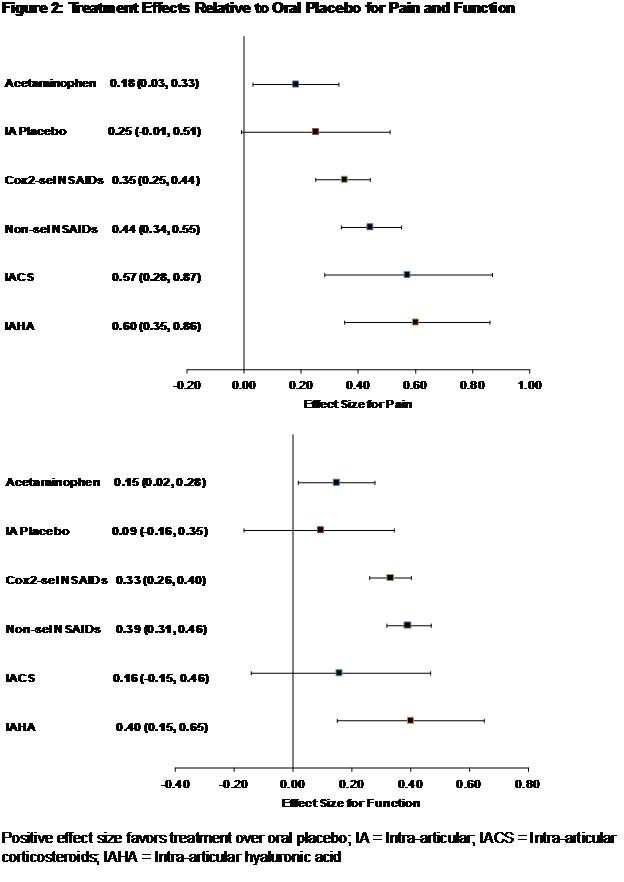Session Information
Session Type: Abstract Submissions (ACR)
Background/Purpose: With the rapidly aging US population and obesity epidemic, the prevalence of knee osteoarthritis (OA) is increasing exponentially. Although a wide variety of symptomatic interventions are available, head to head comparisons are limited, and no study compares all of the treatment options against each other.
To date, we have relied on traditional meta-analysis, which only provides the relative merits of options compared directly in randomized controlled trials (RCTs) for a given condition. Network meta-analysis—an innovative approach for comparing multiple interventions in a single analysis- combines direct (head to head) and indirect (through a common comparator) evidence to increase power and precision for the effect estimates and also assigns probabilities of superiority. This approach can determine the relative comparative effectiveness of interventions that have never been compared directly in a single trial.
Methods: We searched Medline, EMBASE, Web of Science and Cochrane Database from inception to April 2013 with no language restrictions and actively sought unpublished data. We included RCTs conducted in adults with knee OA comparing two or more of the following most widely prescribed treatments: acetaminophen, non-selective NSAIDs (diclofenac, ibuprofen, naproxen), Cox-2 selective NSAIDs (celecoxib), intra-articular (IA) corticosteroids, IA hyaluronic acid, oral placebo and IA placebo. We calculated effect sizes for pain and function for each study at 12 weeks from baseline. We performed network meta-analysis using a Bayesian random effects model with non-informative priors.
Results: Of the 127 eligible RCTs, 124 reported pain and 72 reported function outcomes. These trials included 29,842 participants with an age range of 45-75 years (Figure 1). The proportion of women ranged from 28% – 100%. For pain, all treatments were better than oral placebo and all were better significantly except for IA placebo (Figure 2). For function, oral treatments had effect sizes similar to pain, but IA treatments had a smaller effect size though comparable to oral treatments.
Conclusion: For knee OA pain, IA treatments were more efficacious than oral treatments may be because of the integrated IA placebo effect. Both cox-2 selective and non-selective NSAIDs were substantially better than acetaminophen. This information along with the safety profile and relative cost would be helpful for clinicians in choosing care tailored to individual patient. This novel method may be of additional value for the treatment guideline groups, who would like to weigh multiple interventions against a common comparison.
Disclosure:
R. R. Bannuru,
None;
T. E. McAlindon,
NIH,
2;
J. B. Wong,
None;
D. Kent,
None;
C. Schmid,
None.
« Back to 2013 ACR/ARHP Annual Meeting
ACR Meeting Abstracts - https://acrabstracts.org/abstract/comparative-effectiveness-of-pharmacological-interventions-for-knee-osteoarthritis-a-network-meta-analysis/


